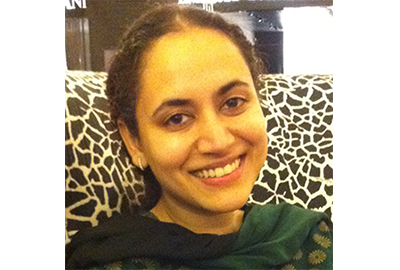Alumni profile: Radhika Mittal
In this alumni profile Dr Radhika Mittal discusses how her MA thesis at University of Hamburg led to her to complete a PhD and work as a media sociologist, specialising in climate change messaging.

Radhika Mittal / India
Mundus Cohort 06-08 / Hamburg
Dr Radhika Mittal is a Media Sociologist and Public Discourse Analyst. Originally from Mumbai, India, Radhika started her journalism career as a copy desk editor at one of India’s biggest newspapers. Somewhere along the way she realised that she was more interested, however, in understanding the influence of media on society. Since graduating from the Mundus programme in 2008 she’s found a way to turn this interest into a profession, and now focuses on exploring how climate change and sustainability is communicated in the media.
At the moment Radhika describes herself as a freelancer of sorts. She’s currently affiliated with TERI (The Energy and Resources Institute) in New Delhi, headed by Dr Rajendra K. Pachauri, also chair of the Nobel Peace Prize winning IPCC (Intergovernmental Panel on Climate Change), but she teaches alongside this at various universities, works on her own research, and is busy drafting a documentary exploring mediated awareness of sustainable food practices. Somewhere along the way she also finds time to fit in a bit of travel.
“I may not necessarily teach on how to write for the press,” she says of her work, “but I teach on how to really understand the media world, how contemporary issues intersect, what is the socio-developmental relevance of these topics and how they can be communicated better.”
“I may not necessarily teach on how to write for the press,” she says of her work, “but I teach on how to really understand the media world, how contemporary issues intersect, what is the socio-developmental relevance of these topics and how they can be communicated better.”
Like her entry into the Mundus programme, Radhika’s career direction has been the result of a certain amount of fate. It was during a gap year that she took from working at the paper that her father noticed an ad in a newspaper for a research-oriented master’s degree. With barely a couple of days to put together her application materials, she took a chance, and soon found herself on the way to Aarhus for the programme. “I think it's been key to developing a lot of the background for the kind of work that I now do,” she says.
It was a conversation at Hamburg University on the second year of the programme that sparked her exploration into the ways in which media communicate climate change. Professor Irene Neverla needed some more data for a project she was working on and asked Radhika if she’d be interested in exploring how climate change issues were framed in Indian media.The project and topic became the focus of her thesis and the very first such analysis of Indian media coverage at the time (later published as a paper), kicking into motion a career focused around climate change and sustainability. It was also a chance conversation during a trip to Australia that led Radhika to meet the thesis supervisor for her PhD, which she completed at Macquarie University in Sydney. This project looked into how sustainable food practices were framed in Australian and American media.
"I was somewhere in the middle...I just took it as a great programme where I was getting to learn a lot of things and really getting introduced to research."
As for her time on the Mundus programme - Radhika says she came to Europe keen to learn but not sure what direction she would head in. "I was somewhere in the middle...I just took it as a great programme where I was getting to learn a lot of things and really getting introduced to research." And perhaps that's a good summary of her career to date - taking chances, weaving between research, academia and more practical aspects of journalism; she's somewhere in the middle of it all. And amongst all this she's also been able to find a niche for her work in the emerging field of climate change communication:
"I have to explain what my work is about because people say 'oh well you’re a communications person so you do strategy' and that's not just what I do. I don't necessarily develop strategies for you to reach out to the public. I help decipher discourses and talk about how we can create better, more impactful, actionable messages, while enabling the understanding and contextualisation of contemporary social issues."
Learn more here about Radhika's work.
Are you a Mundus Journalism student or alumni? Connect with us:
- Find our private alumni group on facebook for networking, job and collaboration opportunities
- Show potential employers you're associated with the programme by adding '@mundusjourn graduate' (or student)'\ to your twitter or '@mundus_journ graduate' (or student) to your instagram profile
- Additionally, tag us with your work links or relevant photos on twitter and instagram to share with the network. We use hashtags: #mundusjournalism #mundushegemony #EMJalumni #EMJstudents